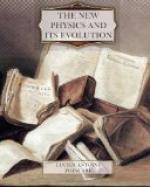One of the most interesting consequences of the recent discoveries has been to rehabilitate in the eyes of scholars, speculations relating to the constitution of matter, and, in a more general way, metaphysical problems. Philosophy has, of course, never been completely separated from science; but in times past many physicists dissociated themselves from studies which they looked upon as unreal word-squabbles, and sometimes not unreasonably abstained from joining in discussions which seemed to them idle and of rather puerile subtlety. They had seen the ruin of most of the systems built up a priori by daring philosophers, and deemed it more prudent to listen to the advice given by Kirchhoff and “to substitute the description of facts for a sham explanation of nature.”
It should however be remarked that these physicists somewhat deceived themselves as to the value of their caution, and that the mistrust they manifested towards philosophical speculations did not preclude their admitting, unknown to themselves, certain axioms which they did not discuss, but which are, properly speaking, metaphysical conceptions. They were unconsciously speaking a language taught them by their predecessors, of which they made no attempt to discover the origin. It is thus that it was readily considered evident that physics must necessarily some day re-enter the domain of mechanics, and thence it was postulated that everything in nature is due to movement. We, further, accepted the principles of the classical mechanics without discussing their legitimacy.
This state of mind was, even of late years, that of the most illustrious physicists. It is manifested, quite sincerely and without the slightest reserve, in all the classical works devoted to physics. Thus Verdet, an illustrious professor who has had the greatest and most happy influence on the intellectual formation of a whole generation of scholars, and whose works are even at the present day very often consulted, wrote: “The true problem of the physicist is always to reduce all phenomena to that which seems to us the simplest and clearest, that is to say, to movement.” In his celebrated course of lectures at l’Ecole Polytechnique, Jamin likewise said: “Physics will one day form a chapter of general mechanics;” and in the preface to his excellent course of lectures on physics, M. Violle, in 1884, thus expresses himself: “The science of nature tends towards mechanics by a necessary evolution, the physicist being able to establish solid theories only on the laws of movement.” The same idea is again met with in the words of Cornu in 1896: “The general tendency should be to show how the facts observed and the phenomena measured, though first brought together by empirical laws, end, by the impulse of successive progressions, in coming under the general laws of rational mechanics;” and the same physicist showed clearly that in his mind this connexion of phenomena with mechanics had a deep




